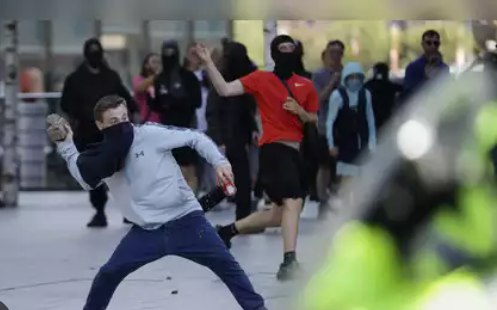Blessing Oyindamola, a Nigerian working as a customer service advisor, lives in Manchester, one of the first cities to be attacked by rioters. She was gearing up for her child’s first birthday and had plans to go pick up a cake before the ongoing riots in the United Kingdom started.
Since then, she has spent most of her time at home, afraid of what could happen if she came across the rioters.
“We feel targeted but have not experienced any (violence) first-hand because we would rather not leave home,” she told PREMIUM TIMES about the riots which are now targeting immigrants around the UK.
The riots began after three young girls were killed in a knife attack at a Taylor Swift-themed dance and yoga event in Southport, north England, last Monday.
According to local news, the riots have been fuelled by misinformation online, the far-right and anti-immigration sentiment.
When Yemi Olawepo, an Administrative Assistant and Data Processor living in Bournemouth, first spoke to this reporter on Tuesday, he did not feel targeted as his city was calm. Instead, he was emotionally traumatised.
“At the moment, I do not feel targeted… even if you do not feel targeted, you could be a target because you do not know the intent of the other person in the bus, at the bus station, while walking or passing by a handful of people,” he said.
This calm was short-lived. About 24 hours after the first exchange with this reporter, the riots reached Bournemouth. Now, Mr Olawepo is concerned about the welfare of his family, especially his children, who are due to be back in school in a few weeks.
“Just this evening, the protests are happening in the city I reside in, and people are scared of the uncertainties in Bournemouth,” he told this reporter.
Like Mr Olawepo, Mamuzo Adums, who lives in London, has yet to witness any riots in his area but is affected emotionally by the news he has received so far from friends living in affected areas.
“It is a shame what is happening in the UK… I knew there was subtle racism but I could never have imagined this will happen,” Mr Adums said. He encouraged Nigerians in the UK to shut down any rhetoric being perpetuated online by “racist hoodlums” and far rights influencers.
“We must not allow their lies fly. We are good people and we behave ourselves in an orderly manner in this country and should not be made to feel unsafe or suffer,” he added.
Although Mrs Oyindamola sympathises with the loss of the young girls, she believes it is being used as a cover to act on existing grievances.
“A lot of Brits are of the notion that immigrants come here free, get all the jobs, stay in five-star hotels and take all the benefits,” she noted.
She said she is comforted by her British friends, who have condemned the ongoing violence. “We will continue to be upstanding members of society and hope to be accorded the same respect and dignity.”
While the protests continue to spread across different cities, the British Prime Minister Keir Starmer has assured the public that offenders will be made to face the law.
“I utterly condemn the far-right thuggery we have seen this weekend. Be in no doubt, those who have participated in this violence will face the full force of the law,” he said on Sunday on X.
BBC reported that three men who admitted taking part in riots in Southport and Liverpool in the days after the three girls were killed have been jailed.
Responding to the widespread racist and anti-immigrant riots, groups of anti-racist protesters hit the streets wielding placards reading “refugees welcome,” “stop the far right.”
On Monday, the Nigerian government issued a security advisory to Nigerians wanting to travel to the United Kingdom.
“The violence has assumed dangerous proportions as evidenced by reported attacks on law enforcement agents and damage to infrastructure. “To this end, citizens are advised to be extra vigilant, avoid political processions and protests, rallies or marches,” the advisory read.
On Tuesday, the head of NIDCOM, the Nigerian agency responsible for the interests of Nigerians in the Diaspora, met with the British High Commissioner to Nigeria, Richard Mongomery, and other officials to discuss the fate of Nigerians living in the UK amidst the riots.
At the meeting, Mr Mongomery assured Nigerians in the UK of their safety and security. However, many of them, like Ms Oyindamola, still feel unsafe.







